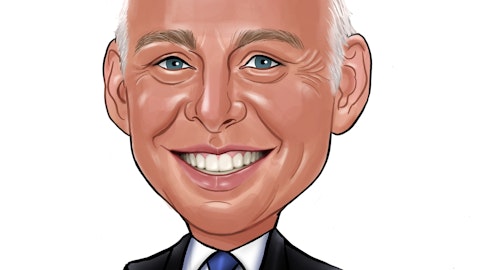I think that’s a big positive development relative to the size of the renewable business that we have coupled with our transmission assets. And I think that’s something that’s resonating well with the industry. And I think there’s very few people that can do that. So it puts us in a very small group and we’re pretty excited about that. So, yes, I do think that that’s an important part of our long-term strategy. And I think over the coming quarters we’ll be able to announce our own deals relative to that. When we think about the comments that Paul made around really working capital and how we think about our dollars and our investments not to make excuses our team has been really focused on a number of acquisitions over the course of the last two or three years.
It takes a lot of time to integrate these deals. There’s no question that we as an organization feel that we’ve lost some focus on managing working capital. I think this is definitely one of Paul’s strengths coming into this role. I know he’s hyper-focused on it, and will make the organization refocus on it. It is definitely something that we’ve been talking about more and more and more over the last few months. Compensation will be tied to it and I expect to see significant improvements. We take a lot of pride in that for years. We led in every single one of those categories across the peer group. And our goal is to get back there and lead the peer group again relative to all of those metrics.
Jamie Cook: Thank you.
Jose Mas: Thanks, Jamie.
Operator: Next question comes from Brent Thielman with D.A. Davidson. Please go ahead.
Brent Thielman: Hey, thanks. Good morning. Jose, the Power Delivery backlog obviously very good maybe not completely representative of the kind of market that we’re in and where we’re headed. So I’d love to just get your comments on the trajectory of that backlog as we work our way through the year? Maybe if there’s anything holding that back. But ultimately where you’re seeing that going from here?
Jose Mas: First, I think it’s important to keep in mind right we made a number of acquisitions in the last two years. The bulk of the work that we’re doing today is recurring maintenance-type work. So it’s not driven by large projects. It’s everyday book and burn business which is really important. That’s the bulk of what that unit does today. I think it was really important to get our arms around everything that we acquired rationalize the business make sure that the customers that we’re working with give us an opportunity to earn a fair wage. So I think we’re doing that. I think that’s been the focus over the course of the last 1.5 years two years. I think we’ve made great improvements. If you look at not just the margin improvements in the business, but quite frankly the margin dispersion amongst that business, I think each of those groups is performing a lot tighter than it ever has.
I still think there’s some differences there, where we think there’s tremendous opportunities for improvement, but we feel really good about the progress we’ve made there, but it really has been based on a lot of the recurring-type work which we think is critically important. We talked a lot about on our fourth quarter call about the investments that we’re making on the larger project work. We’re gearing for it. We started one large project. We expect to win others. So I think that’s definitely part of the mix but it’s not part of what’s necessarily rolled into our numbers today. I think the bulk of what we’ve done the bulk of the success that we’ve had has been really focused on the recurring maintenance type work and I think we’ll start layering on some of the project work and I think you’ll see that roll in over the course of the next year or two.




